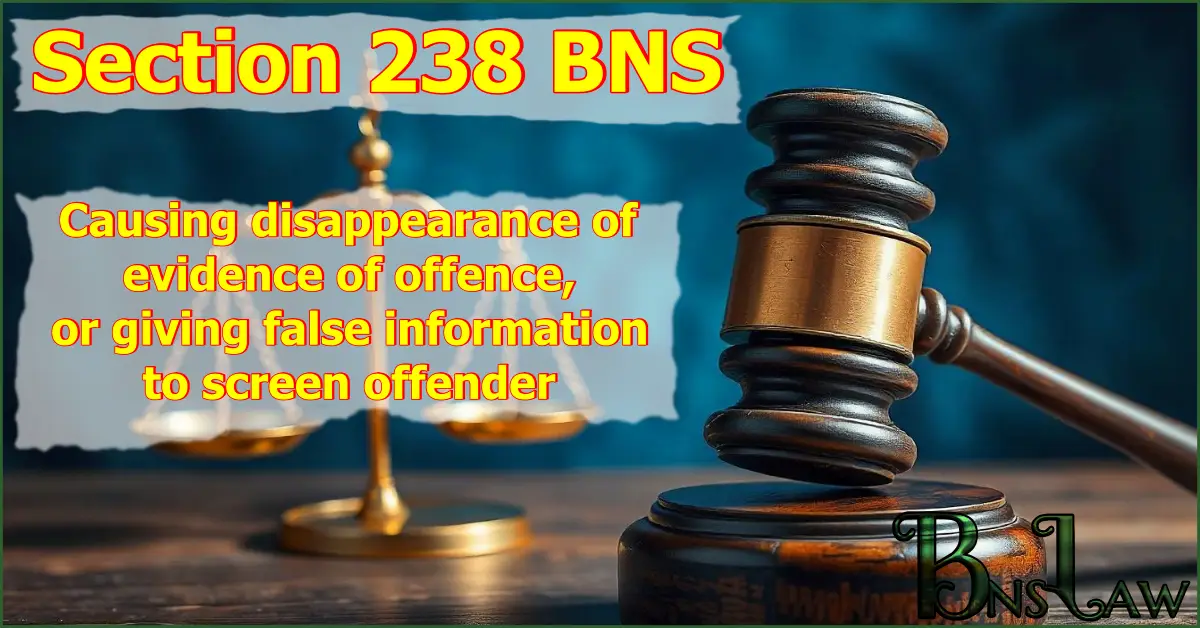Section 238 BNS | BNS 238
Whoever, knowing or having reason to believe that an offence has been committed, causes any evidence of the commission of that offence to disappear, with the intention of screening the offender from legal punishment, or with that intention gives any information respecting the offence which he knows or believes to be false shall,—
238(a) BNS
if the offence which he knows or believes to have been committed is punishable with death, be punished with imprisonment of either description for a term which may extend to seven years, and shall also be liable to fine;
238(b) BNS
if the offence is punishable with imprisonment for life, or with imprisonment which may extend to ten years, be punished with imprisonment of either description for a term which may extend to three years, and shall also be liable to fine;
238(c) BNS
if the offence is punishable with imprisonment for any term not extending to ten years, be punished with imprisonment of the description provided for the offence, for a term which may extend to one-fourth part of the longest term of the imprisonment provided for the offence, or with fine, or with both.
Illustration
A, knowing that B has murdered Z, assists B to hide the body with the intention of screening B from punishment. A is liable to imprisonment of either description for seven years, and also to fine.
READ OTHER SECTIONS OF CHAPTER XIV — OF FALSE EVIDENCE AND OFFENCES AGAINST PUBLIC JUSTICE
FAQs of BNS Section 238
-
238 BNS punishment and fine
Punishment and fine under Section 238 of the BNS—
238(a): Imprisonment for 7 years and fine.
238(b): Imprisonment for 3 years and fine.
238(c): Imprisonment for one-fourth of the longest term provided for the offence, or fine, or both. -
238 BNS cognizable or not
In Section 238(a), according as the offence in relation to which disappearance of evidence is caused is cognizable or non-cognizable and the offence under Section 238(b) and 238(c) of the BNS is non-cognizable.
-
238 BNS bailable or not
The offence under Section 238(a), 238(b) and 238(c) of the BNS is bailable.
-
238 BNS trial court
Offence specified in Section 238(a) of the BNS is triable by the court of session, offence specified in Section 238(b) of the BNS is triable by the Magistrate of the first class, while the offence specified in Section 238(c) is triable by a Court by which the offence is triable.
Important Points
- Cognizable Offences: These are offences where a police officer can arrest a person without a warrant.
- Non-Cognizable Offences: These are offences where a police officer cannot arrest a person without a warrant.
- Bailable Offences: These are offences where the accused can get bail from the police station itself. All bailable offences are listed in the First Schedule of the Bharatiya Nagarik Suraksha Sanhita (BNSS).
- Non-Bailable Offences: Offences in which bail is not granted directly from the police station but after hearing the case in the court, the judge decides when bail will be granted. All non-bailable offences are listed in the first schedule of the Bharatiya Nagarik Suraksha Sanhita (BNSS).
- In the above FAQ, “trial court” means the court that has jurisdiction to try the offence.
- In the above FAQ, the expression “Magistrate of the first class” and “Any Magistrate” does not include Executive Magistrates.
Read other Sections of the BNS
Reference Link: New Criminal Laws (BNS), Ministry of Home Affairs







